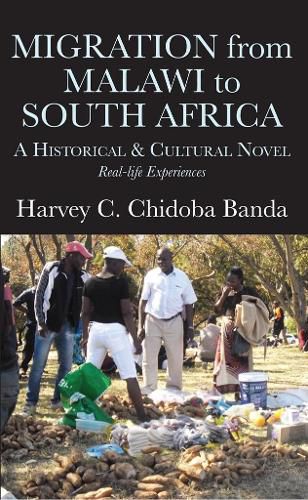Readings Newsletter
Become a Readings Member to make your shopping experience even easier.
Sign in or sign up for free!
You’re not far away from qualifying for FREE standard shipping within Australia
You’ve qualified for FREE standard shipping within Australia
The cart is loading…






This title is printed to order. This book may have been self-published. If so, we cannot guarantee the quality of the content. In the main most books will have gone through the editing process however some may not. We therefore suggest that you be aware of this before ordering this book. If in doubt check either the author or publisher’s details as we are unable to accept any returns unless they are faulty. Please contact us if you have any questions.
Since the discovery and exploitation of minerals like gold, diamond and copper in South Africa, Zimbabwe and Zambia in the late nineteenth and early twentieth centuries, Malawi has played the role of a labour supplier. Malawians were attracted by the relatively higher wages obtaining in the South African mines up to the period of the decline in mine migrancy at the end of the 1980s. Following this decline, a cross-section of Malawians continued to emigrate to South Africa to seek various jobs in the burgeoning informal sector and also for trade purposes. Migration from Malawi to South Africa sheds light on the problems that labour migrants and traders encounter as they are ‘toing’ and ‘froing’ between Malawi and South Africa in pursuit of their respective goals. It shows that migration, which initially was exclusively done for wage employment, is becoming more complex by the day. This is a result of the infusion of elements of commercial migration, smuggling and human trafficking. The book advances the argument that the numbers of migrants to South Africa increased in the post-1994 period partly as a result of mal-administration by the successive democratically-elected governments in Malawi. This development weakened Malawi’s otherwise promising economy and impoverished the rural masses. The book ‘sees’ forlorn hope in the future of labour migrants and traders, unless the Malawi Government starts to genuinely have the welfare of the populace at heart! The book is relevant and accessible to policy-makers, university and college students interested in migration studies, general readers and migrants, themselves
$9.00 standard shipping within Australia
FREE standard shipping within Australia for orders over $100.00
Express & International shipping calculated at checkout
This title is printed to order. This book may have been self-published. If so, we cannot guarantee the quality of the content. In the main most books will have gone through the editing process however some may not. We therefore suggest that you be aware of this before ordering this book. If in doubt check either the author or publisher’s details as we are unable to accept any returns unless they are faulty. Please contact us if you have any questions.
Since the discovery and exploitation of minerals like gold, diamond and copper in South Africa, Zimbabwe and Zambia in the late nineteenth and early twentieth centuries, Malawi has played the role of a labour supplier. Malawians were attracted by the relatively higher wages obtaining in the South African mines up to the period of the decline in mine migrancy at the end of the 1980s. Following this decline, a cross-section of Malawians continued to emigrate to South Africa to seek various jobs in the burgeoning informal sector and also for trade purposes. Migration from Malawi to South Africa sheds light on the problems that labour migrants and traders encounter as they are ‘toing’ and ‘froing’ between Malawi and South Africa in pursuit of their respective goals. It shows that migration, which initially was exclusively done for wage employment, is becoming more complex by the day. This is a result of the infusion of elements of commercial migration, smuggling and human trafficking. The book advances the argument that the numbers of migrants to South Africa increased in the post-1994 period partly as a result of mal-administration by the successive democratically-elected governments in Malawi. This development weakened Malawi’s otherwise promising economy and impoverished the rural masses. The book ‘sees’ forlorn hope in the future of labour migrants and traders, unless the Malawi Government starts to genuinely have the welfare of the populace at heart! The book is relevant and accessible to policy-makers, university and college students interested in migration studies, general readers and migrants, themselves